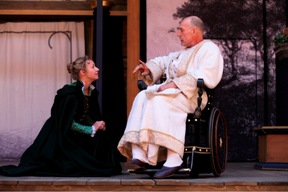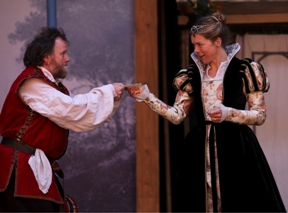All's Well That Ends Well, Shakespeare's Globe | reviews, news & interviews
All's Well That Ends Well, Shakespeare's Globe
All's Well That Ends Well, Shakespeare's Globe
James Garnon's Parolles steals the show in what surprises as a well-plotted comedy
Trust the "wooden O" to set the Shakespearean record straighter than usual. In John Dove's production, this is no problem play but a bright comedy where the immaculate plotting proves more admirable than its questionable characters. Its low cuddleability quotient will never make All's Well Everyman's favourite; the heroine has Rosalind's or Viola's resourcefulness and none of their charm as she pursues a callow, snobbish young man whom you can't at first blame for feeling cornered but who ends up an irredeemable cad. The figure of fun despised by everyone else in the play, the mouthy Parolles, is the only real candidate for our affections; so it was a foregone conclusion that the Globe actor with the best track record in energetic comedy, James Garnon, would steal the show.
Which he did, for much of its duration; though equally fiery ensemble work made sure that all ended surprisingly well indeed. How like the Globe, how unlike the disillusioned, downbeat ending this play usually receives, when it receives it at all. A brilliant, witty pre-performance talk by Professor Michael Dobson - up to now of Birkbeck, soon heading to Stratford-upon-Avon's Shakespeare Centre - gave a very different interpretation of the characters' motivations than the rather more straightforward one we then saw on stage. But that kind of reading would need a more nuanced pair of young leads than Ellie Piercy and Sam Crane.
 Piercy (pictured right with Sam Cox's King of France) makes a good distinction between the nervy daring of Helena's first plot instigation - curing the regent's fistula with her late father's healing arts to gain as husband the son of the household in which she serves as dependent ward - and, when that fairytale comes smack up against the reality of her victim's dismay, the growing command with which she manipulates the second, the infamous "substitute bed-trick" whereby she takes the place of chaste maid Diana in the unloving object of desire's nocturnal assignation.
Piercy (pictured right with Sam Cox's King of France) makes a good distinction between the nervy daring of Helena's first plot instigation - curing the regent's fistula with her late father's healing arts to gain as husband the son of the household in which she serves as dependent ward - and, when that fairytale comes smack up against the reality of her victim's dismay, the growing command with which she manipulates the second, the infamous "substitute bed-trick" whereby she takes the place of chaste maid Diana in the unloving object of desire's nocturnal assignation.
 More low key, but unobtrusively - and surprisingly - the finest speaker of Shakespearean verse in the company, is Janie Dee as the Countess (pictured left with Colin Hurley's Lavatch), graduated from sweet soprano ingénue of the musicals into a mezzo-ish grande dame whose voice is ever firm and low. She makes you wonder why there's so often a buzz about turning the role of the fortysomething mother who does what she thinks is best for son Bertram and ward Helena into a glamorous granny: Peggy Ashcroft and, more recently, Judi Dench, have been given licence to dominate more than is good for the drama as a whole (and, as Dobson earlier reminded us, in the last RSC production too many members of the audience were caught whispering "Where's Judi?" through most of the second half).
More low key, but unobtrusively - and surprisingly - the finest speaker of Shakespearean verse in the company, is Janie Dee as the Countess (pictured left with Colin Hurley's Lavatch), graduated from sweet soprano ingénue of the musicals into a mezzo-ish grande dame whose voice is ever firm and low. She makes you wonder why there's so often a buzz about turning the role of the fortysomething mother who does what she thinks is best for son Bertram and ward Helena into a glamorous granny: Peggy Ashcroft and, more recently, Judi Dench, have been given licence to dominate more than is good for the drama as a whole (and, as Dobson earlier reminded us, in the last RSC production too many members of the audience were caught whispering "Where's Judi?" through most of the second half).
The comic parts are graded according to their merits, too, from Hurley's dignified shot at a not very funny clown to the Victor Meldrewish apoplexies of Michael Bertenshaw's Lafeu and the more central role of Parolles, whose braggadocio as boastful, primping Landsknecht - well adapted to the Jacobean frills of Michael Taylor's handsome designs - gets its comeuppance in direct parallel to his superior comrade-in-arms Bertram's duping. By now we've moved from the eternal summer of the French-in-mourning to Italy by night, a plot shift deftly suggested in Dove's traditional but handsome production with the minimum of lighting and painted backdrops, as well as smart velvets for the witty, streetwise ladies of the town.
 We're familiar with the Garnon coxcomb - eventually to be flattened along with Parolles's never very firmly grounded or brutal confidence - as well as the questioning "mm"s which tickle the groundlings minutes into his first, applause-winning scene with Piercy. Some usually hardgoing stuff about virginity is turned into comic gold here. The scene of his worsting (pictured right) as his French comrades ape gobbledegook-spouting enemies is allowed to reach its hysterical peak before subsiding to his lone realisation that he's ruined. For once one of the greatest lines in all Shakespeare, "simply the thing I am shall make me live", passes almost unnoticed, but Garnon still gets some realistic mileage out of the humbled Parolles back at the French court.
We're familiar with the Garnon coxcomb - eventually to be flattened along with Parolles's never very firmly grounded or brutal confidence - as well as the questioning "mm"s which tickle the groundlings minutes into his first, applause-winning scene with Piercy. Some usually hardgoing stuff about virginity is turned into comic gold here. The scene of his worsting (pictured right) as his French comrades ape gobbledegook-spouting enemies is allowed to reach its hysterical peak before subsiding to his lone realisation that he's ruined. For once one of the greatest lines in all Shakespeare, "simply the thing I am shall make me live", passes almost unnoticed, but Garnon still gets some realistic mileage out of the humbled Parolles back at the French court.
And the best really is last, as the entire company, led by Sam Cox's commanding King of France and further fuelled by Cranston's righteous indignation, works light-hearted theatrical magic on the long finale of reconciliation, or rather what a friend of mine, maddened by the endless revelations of Cymbeline, once called the "I was that toothbrush" scene. You know you're in good hands when it passes in a flash - not so common in productions of Shakespeare's comedies, but Dove refuses to be wrong-footed - and I like the way William Lyons' consummate musicians, having given us good contrast between the dreamy celesta of Helena's schemes, fanfares for the King of France and drum-led militarism way down yonder in warring Tuscany, lead the company from solemn pavane through to galliards and lavoltas. By no means all the punters had stayed for the second half, but those who did were rewarded with a familiar Globe spirit of delight.
- All's Well That Ends Well at Shakespeare's Globe until 21 August
- Read theartsdesk's reviews of Shakespeare's Globe productions
- Find out more about Globe Education's pre-performance events and special talks
more Theatre
 Banging Denmark, Finborough Theatre review - lively but confusing comedy of modern manners
Superb cast deliver Van Badham's anti-incel barbs and feminist wit with gusto
Banging Denmark, Finborough Theatre review - lively but confusing comedy of modern manners
Superb cast deliver Van Badham's anti-incel barbs and feminist wit with gusto
 London Tide, National Theatre review - haunting moody river blues
New play-with-songs version of Dickens’s 'Our Mutual Friend' is a panoramic Victori-noir
London Tide, National Theatre review - haunting moody river blues
New play-with-songs version of Dickens’s 'Our Mutual Friend' is a panoramic Victori-noir
 Machinal, The Old Vic review - note-perfect pity and terror
Sophie Treadwell's 1928 hard hitter gets full musical and choreographic treatment
Machinal, The Old Vic review - note-perfect pity and terror
Sophie Treadwell's 1928 hard hitter gets full musical and choreographic treatment
 An Actor Convalescing in Devon, Hampstead Theatre review - old school actor tells old school stories
Fact emerges skilfully repackaged as fiction in an affecting solo show by Richard Nelson
An Actor Convalescing in Devon, Hampstead Theatre review - old school actor tells old school stories
Fact emerges skilfully repackaged as fiction in an affecting solo show by Richard Nelson
 The Comeuppance, Almeida Theatre review - remembering high-school high jinks
Latest from American penman Branden Jacobs-Jenkins is less than the sum of its parts
The Comeuppance, Almeida Theatre review - remembering high-school high jinks
Latest from American penman Branden Jacobs-Jenkins is less than the sum of its parts
 Richard, My Richard, Theatre Royal Bury St Edmund's review - too much history, not enough drama
Philippa Gregory’s first play tries to exonerate Richard III, with mixed results
Richard, My Richard, Theatre Royal Bury St Edmund's review - too much history, not enough drama
Philippa Gregory’s first play tries to exonerate Richard III, with mixed results
 Player Kings, Noel Coward Theatre review - inventive showcase for a peerless theatrical knight
Ian McKellen's Falstaff thrives in Robert Icke's entertaining remix of the Henry IV plays
Player Kings, Noel Coward Theatre review - inventive showcase for a peerless theatrical knight
Ian McKellen's Falstaff thrives in Robert Icke's entertaining remix of the Henry IV plays
 Cassie and the Lights, Southwark Playhouse review - powerful, affecting, beautifully acted tale of three sisters in care
Heart-rending chronicle of difficult, damaged lives that refuses to provide glib answers
Cassie and the Lights, Southwark Playhouse review - powerful, affecting, beautifully acted tale of three sisters in care
Heart-rending chronicle of difficult, damaged lives that refuses to provide glib answers
 Gunter, Royal Court review - jolly tale of witchcraft and misogyny
A five-women team spell out a feminist message with humour and strong singing
Gunter, Royal Court review - jolly tale of witchcraft and misogyny
A five-women team spell out a feminist message with humour and strong singing
 First Person: actor Paul Jesson on survival, strength, and the healing potential of art
Olivier Award-winner explains how Richard Nelson came to write a solo play for him
First Person: actor Paul Jesson on survival, strength, and the healing potential of art
Olivier Award-winner explains how Richard Nelson came to write a solo play for him
 Underdog: the Other, Other Brontë, National Theatre review - enjoyably comic if caricatured sibling rivalry
Gemma Whelan discovers a mean streak under Charlotte's respectable bonnet
Underdog: the Other, Other Brontë, National Theatre review - enjoyably comic if caricatured sibling rivalry
Gemma Whelan discovers a mean streak under Charlotte's respectable bonnet
 Long Day's Journey Into Night, Wyndham's Theatre review - O'Neill masterwork is once again driven by its Mary
Patricia Clarkson powers the latest iteration of this great, grievous American drama
Long Day's Journey Into Night, Wyndham's Theatre review - O'Neill masterwork is once again driven by its Mary
Patricia Clarkson powers the latest iteration of this great, grievous American drama

Add comment